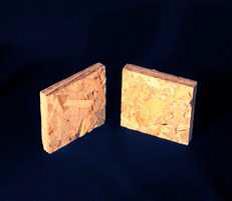Soy-Flour Adhesive Helps Reduce Formaldehyde Emissions
 A soy-flour adhesive, developed with support from the soybean checkoff, may help reduce the emissions of a known carcinogen. SOYAD from H2H Innovations replaces urea formaldehyde in wood adhesives, making the product greener and healthier. In 2004, the International Agency for Cancer Research reclassified formaldehyde from a suspect carcinogen to a known carcinogen.
A soy-flour adhesive, developed with support from the soybean checkoff, may help reduce the emissions of a known carcinogen. SOYAD from H2H Innovations replaces urea formaldehyde in wood adhesives, making the product greener and healthier. In 2004, the International Agency for Cancer Research reclassified formaldehyde from a suspect carcinogen to a known carcinogen.
The adhesive was developed by leveraging soy-based adhesive technologies from Hercules, Inc. and Heartland Resource Technologies, which formed H2H Innovations. The new company has focused on developing cost-competitive, formaldehyde-free resins for decorative plywood, wood flooring, particleboard and medium-density fiberboard markets. The joint venture will also offer technologies for oriented strand board manufacturers that allow traditional phenolic resins to be extended, resulting in lower-cost adhesives with reduced formaldehyde content.
“Reducing formaldehyde emissions is one of the major benefits of developing soy-based adhesives,” says Karen Fear, United Soybean Board New Uses vice chair and a soybean farmer from Montpelier, Ind. “Soy adhesives don’t have an odor and are environmentally friendly.” Soy meal and soy flour are only beginning to penetrate the wood-composite-glue market. For the particleboard and medium-density-fiberboard markets, the greatest interest is having a formaldehyde-free resin to resolve the issue of formaldehyde emissions. This is needed to meet current and anticipated regulatory demands and green initiatives, such as the Leadership in Energy and Environmental Designs (LEED) Green Building Rating System. SOYAD is a soy/phenolic co-resin used in exterior wood panel application, such as oriented strand board and softwood plywood.



